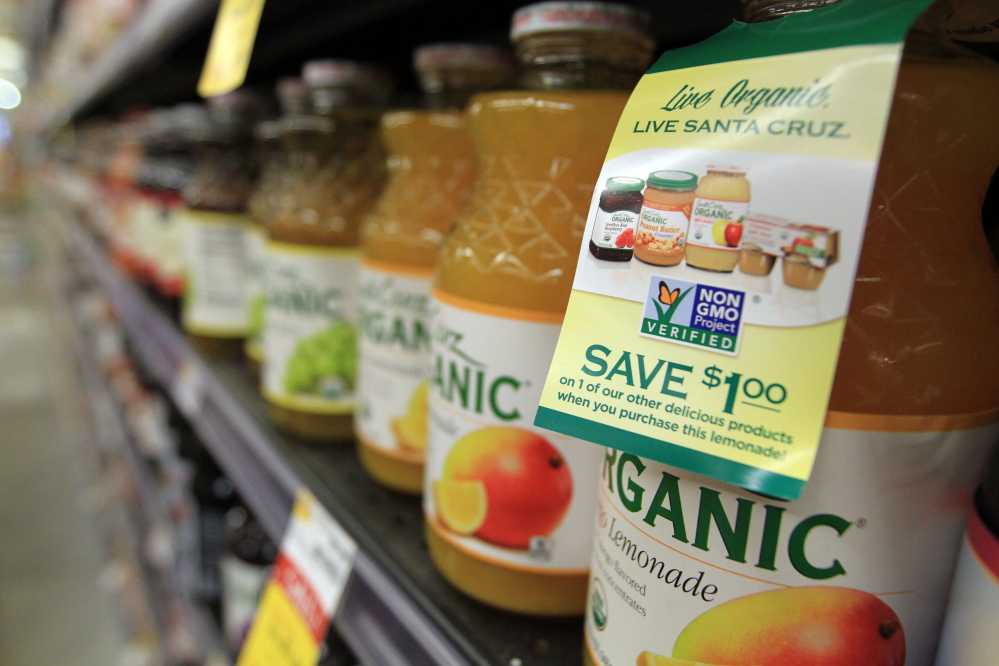U.S. Reps. Chellie Pingree, D-1st District, and Bruce Poliquin, R-2nd District, rarely see eye to eye. But on the matter of GMO labeling, both agree that people deserve to know what’s in their food, and together, they’ve opposed a bill that would prevent states from requiring GMO labels and pre-empt state law in Maine.
The problem is, GMO labels don’t tell consumers much of anything.
Sure, all people want their food to be safe, and most want the opportunity to buy goods that are environmentally sound and come from responsible sources.
But GMO labels won’t help them make that distinction. They don’t tell consumers what food is “good” and what food is “bad.” And fighting over labels distracts from the very real problems and challenges facing food systems worldwide today.
FROM FIELD TO LAB
In this discussion, GMOs, or genetically modified organisms, are crops whose genes have been modified to gain a certain outcome, such as resistance to insects or herbicides, or the addition of nutrients.
Humans have been artificially modifying plants since the beginning of agriculture, crossbreeding plants for a higher yield, or so that they survive in a certain climate. GMOs are simply the result of moving that process inside a laboratory.
GMO opponents paint this process as man playing God, haphazardly manipulating genes in ways they don’t really understand with results they can’t possibly predict.
And the onslaught of scary, vague claims has worked – about 57 percent of Americans believe it is “generally unsafe” to eat foods containing GMOs.
But the science doesn’t back that up.
The U.S. Food and Drug Administration, the World Health Organization, the American Medical Association, the National Academy of Sciences, the American Association for the Advancement of Science and others say that the GMO foods on the market – which are subject to rigorous approval processes – are fine. And lots of credible studies back them up.
(For those unconvinced, there are still thousands of products that carry the Non-GMO Project‘s voluntary label.)
NEED FOR VARIETY
But safety isn’t the foremost concern for anti-GMO groups – it’s only the most easily expressed and most likely to generate fear and, thus, drive policy.
No, most of the organized opposition to GMOs comes from groups that, with good reason, support local agriculture and organic food systems. They oppose – again, with good reason – corporate control of agriculture and the heavy use of herbicides, made possible through the creation of GMO crops that are herbicide-resistant.
Together, they say, these factors lead toward monocultures, the widespread use of crops with identical genetic structures.
That helps increase yield, but it can also lead to major problems.
If the same exact strand of, say, corn is used everywhere, then it all has the same weakness, and can all be decimated by the same disease or insect. We could lose it all at once, with disastrous consequences.
But that’s not an argument against GMOs; it’s an argument for variety.
THE CASE FOR GMOS
Indeed, GMOs have their place.
Genetically modified plants have helped to reduce land and water use as well as the use of insecticide (outweighing, in many cases, the rise in the use of herbicides). They’ve put new nutrients into food and allowed food to be grown where it previously could not be, helping to fight hunger and nutrient deficiency in some of the poorer parts of the planet.
With a population on Earth of 7 billion and growing, and climate change altering agriculture all over the globe, those facts cannot be ignored.
What should be ignored is any argument that lumps all GMOs together.
If you don’t want to eat GMOs because of the toxins and pesticides used in growing them, know that the same toxins have been present in many non-GMO foods, naturally, for a very long time, with no ill effects, and that the same pesticides are used, in one way or another, to produce non-GMO foods.
If you don’t want to eat GMOs because you don’t want to support large agribusiness, know that many of them are produced outside that system, and for the very good purpose of saving newly vulnerable crops or feeding the hungry.
And if you are worried about the impact of monoculture, support a food system that is varied, from sources both organic and traditional, and both local and large-scale.
But don’t dismiss GMOs altogether and risk throwing out the good along with the bad.
Send questions/comments to the editors.



Success. Please wait for the page to reload. If the page does not reload within 5 seconds, please refresh the page.
Enter your email and password to access comments.
Hi, to comment on stories you must . This profile is in addition to your subscription and website login.
Already have a commenting profile? .
Invalid username/password.
Please check your email to confirm and complete your registration.
Only subscribers are eligible to post comments. Please subscribe or login first for digital access. Here’s why.
Use the form below to reset your password. When you've submitted your account email, we will send an email with a reset code.